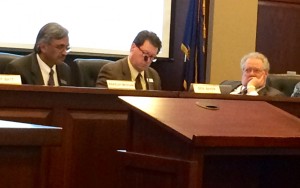New system. Same old problems.
That sums up a report scrutinizing the state’s complex and cumbersome longitudinal student data system.

In developing the new system — the Idaho System for Educational Excellence, or ISEE — the state repeated many of the same mistakes it made when it first tried to create a student data system. In a 2006 report, the state’s Office of Performance Evaluations cautioned against building a system around an unrealistic scope and expectations, and failing to consider the needs and the resources of the districts who submit and use the data.
“Many of those recommendations were ignored,” OPE director Rakesh Mohan told lawmakers who received the 80-page report Monday afternoon.
Idaho has invested $12 million and more than four years into ISEE, the state’s longitudinal student data system. Idaho was the last state to develop such a system, and it accelerated the launch in exchange for receiving federal stimulus dollars to prop up the rest of the K-12 budget.
The system, with ongoing costs of $1.4 million a year, has been fraught with challenges. District officials say they have struggled to meet the extensive, monthly data reporting requirements.
In a presentation to the Joint Legislative Oversight Committee, OPE staffers discussed many of the problems facing districts. Local administrators feel intense pressure to meet the reporting requirements, since state funding hinges on completed reports. District employees often have to work nights and weekends to file the reports on time. Medium-sized districts find themselves in a bit of a catch-22: ISEE compliance work isn’t time-consuming enough to justify a full-time position, but it’s just time-consuming enough that it doesn’t fit with staffers’ old job duties.
Then there are the technological hurdles. The West Ada School District had to devote a server just to uploading data on its 36,000 students. And even when West Ada can successfully upload its data, this can clog up the state’s system and make it impossible for other districts to complete its uploads.
Among OPE’s recommendations: The State Department of Education needs to evaluate its data collection regime, to make sure it aligns with “the goals, needs and capacity” of Idaho school districts.
The data collection topic attracted considerable interest Monday afternoon. In addition to the eight lawmakers on JLOC, several other lawmakers listened to the presentation. State superintendent Sherri Ybarra attended most of the meeting, joined by several staffers.
Pete Koehler, Ybarra’s interim chief deputy, said his boss had no quarrel with OPE’s findings. As a former Nampa School District superintendent, Koehler said he has had “great concern” with the data system.
Koehler said the department is committed to working with school districts to reduce the data collection burden, but he wouldn’t commit to a timetable.
“I would be very reluctant to say, in six months, everything will be cured,” he said. “My greater concern is the lack of faith that school districts have in this system and, frankly, others.”
JLOC members of both parties seemed chastened by the findings.
“It’s very disappointing that we haven’t learned since 2006,” said House Minority Leader John Rusche, D-Lewiston.
Rep. Maxine Bell — a Jerome Republican and co-chair of the budget-writing Joint Finance-Appropriations Committee — said she was “embarrassed” by the situation.
She said she has been hearing concerns from local school administrators for two years. And after the meeting, she offered an anecdotal example. The automated system has requested unique demographic data from one Magic Valley district: the number of American Indians attending its schools. That’s because the district’s sports teams are known as the “Indians.”
More reading: Check out highlights from the report, and OPE’s news release.
Coming next month: JLOC will hear a report on a related system: Schoolnet, which was designed to provide student data for teachers to use to design learning plans. (Disclosure: Schoolnet was funded through a grant from the J.A. and Kathryn Albertson Foundation, which also funds Idaho Education News.)
